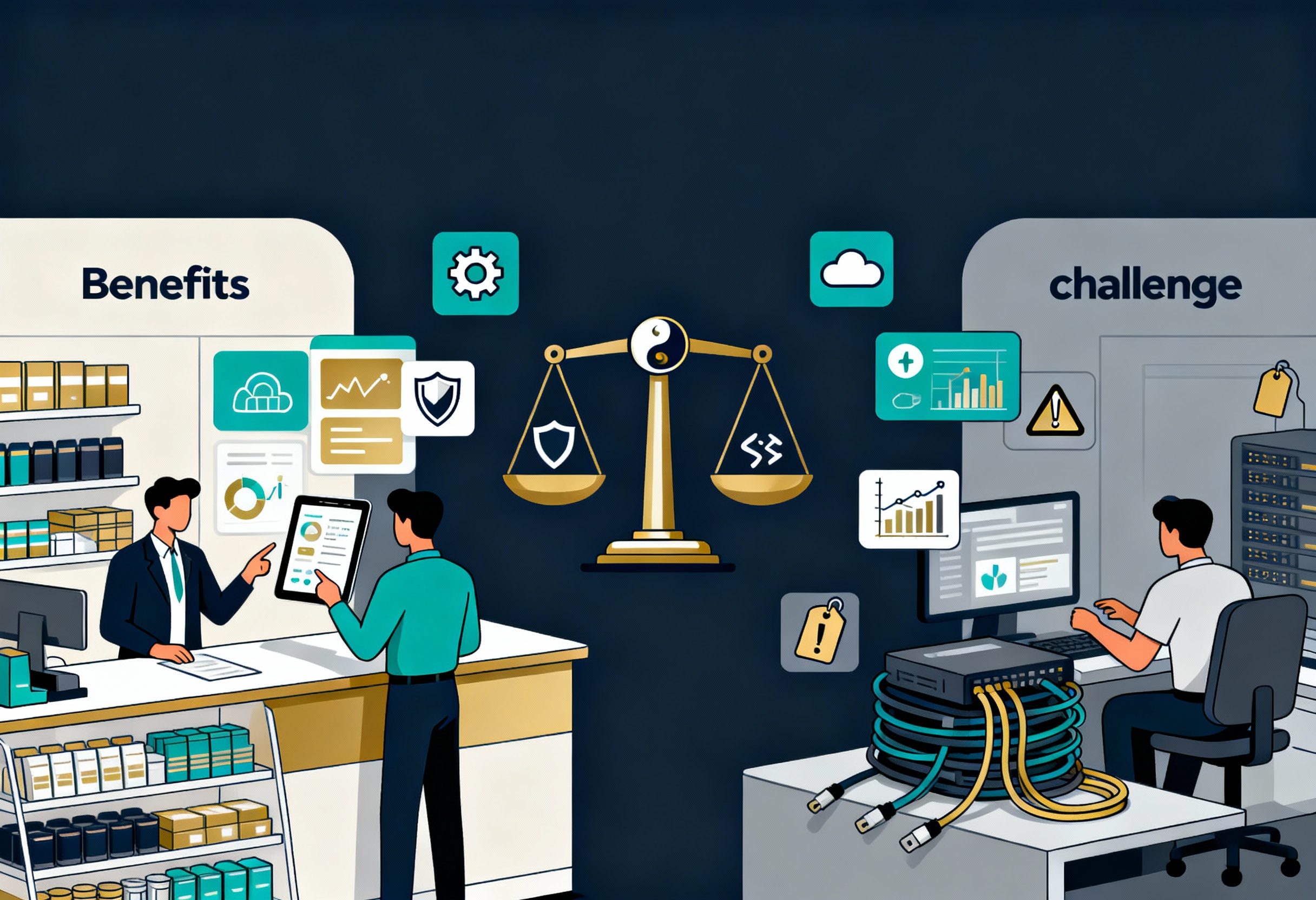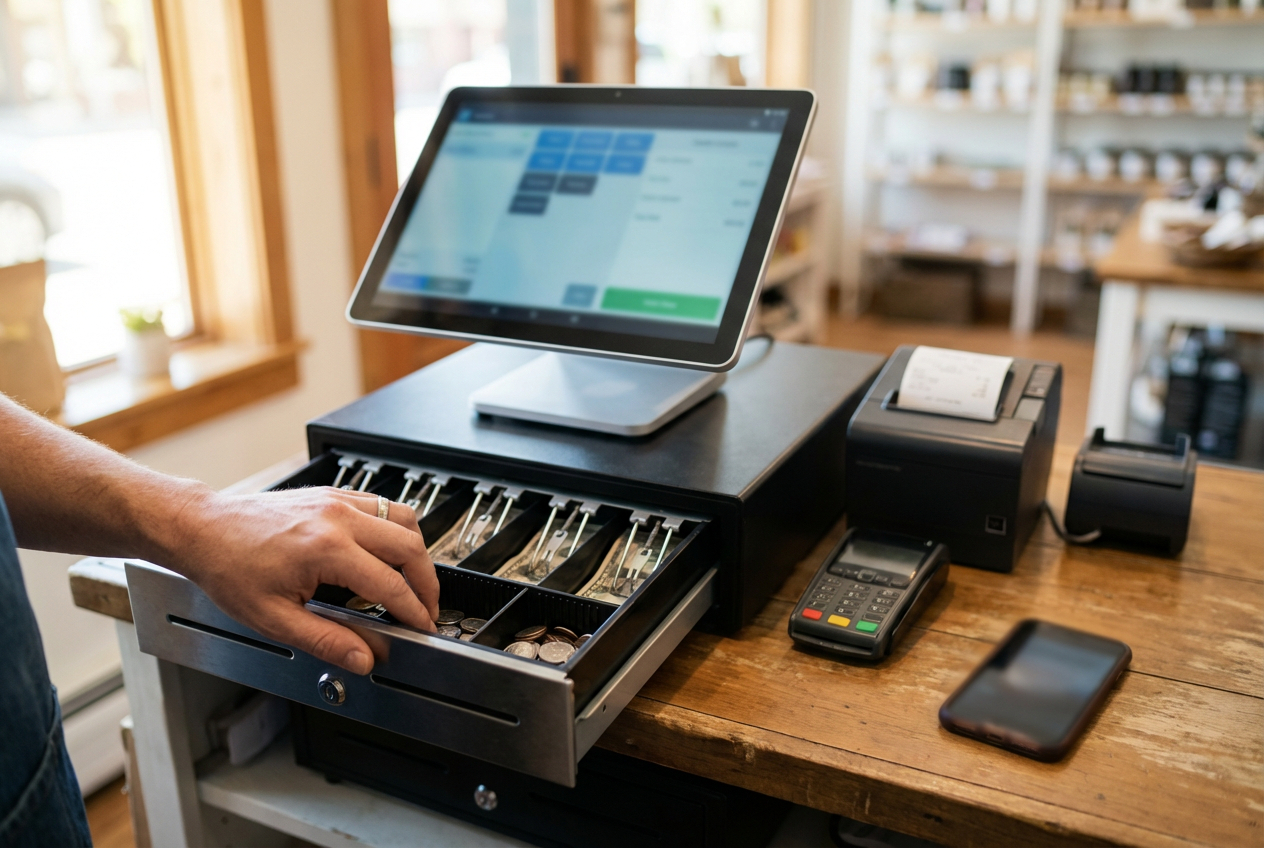Customizable point of sale software has become an imperative driver of operational success across the retail and hospitality industries. It allows businesses to tailor their POS systems to fit unique workflows, sales processes, and customer experiences. Whether you’re managing a boutique retail shop, a restaurant chain, or an enterprise-level franchise, the ability to customize POS functions can make a remarkable difference. However, with flexibility comes complexity.
In this article from ConnectPOS, we will explore the advantages and disadvantages of implementing customizable point of sale software and how to choose the right system to enhance your operations efficiently.
Highlight:
- Customizable point of sale software empowers businesses to align technology with their unique workflows, enhancing efficiency, scalability, and customer experience.
- On the other hand, while offering flexibility and growth potential, such systems require careful planning, investment, and expert implementation to avoid integration or maintenance challenges.
What is Customizable Point of Sale Software?
Customizable point of sale software refers to POS systems that can be tailored to suit a business’s specific operational needs. Unlike traditional off-the-shelf POS solutions, customizable platforms allow businesses to modify key functions such as user interfaces, inventory management modules, payment integrations, loyalty programs, and analytics dashboards.
This flexibility empowers businesses to create a system that mirrors their processes, rather than adjusting workflows to fit a rigid system. For instance, a retailer might integrate e-commerce synchronization, while a restaurant could focus on dynamic menu management. According to Statista, the POS software market is expected to reach $42.5 billion by 2027, signaling strong demand for scalable, adaptable POS systems.
Customizable POS solutions confirm businesses can stay agile in the face of evolving market trends, consumer behaviors, and technological advancements.
Benefits of Implementing a Customizable POS Software
Customizable point of sale software offers numerous advantages that can significantly strengthen business performance and customer satisfaction.
Operational Efficiency
Customizable point of sale software is designed to streamline core business operations and automate manual tasks, leading to a substantial improvement in operational efficiency.
- Automation of routine tasks: When automating processes such as billing, reporting, and inventory tracking, businesses minimize manual errors and free up staff for higher-value work.
- Tailored workflows: Customizable software adapts to specific business models (retail, hospitality, manufacturing, etc.), confirming processes flow seamlessly across departments.
- Faster transaction processing: Custom interfaces and user-friendly dashboards enable quicker checkouts, decreased wait times, and smoother customer experiences, which can improve transaction speed by up to 40%.
- Centralized operations: Businesses managing multiple outlets or sales channels benefit from unified data access, enabling managers to monitor performance and make informed decisions from one platform.
A customizable POS system aligns technology with the company’s operational logic, cutting friction and supporting sustainable scalability.
Enhanced Customer Experience
A key advantage of a customizable POS software lies in its ability to create personalized, data-driven customer experiences. Today, personalization directly influences loyalty and conversion.
- Personalized promotions and loyalty programs: Tailored POS solutions integrate with CRM systems to deliver targeted offers, discounts, and rewards based on purchase history and preferences.
- Omnichannel consistency: Customers expect seamless experiences across in-store and online touchpoints. A customizable POS allows for synchronized inventory and pricing across channels, ensuring consistent shopping experiences.
- Faster service delivery: With integrated mobile POS and self-checkout features, customers can complete transactions swiftly, improving satisfaction and repeat purchases.
- Accurate customer data: The software collects valuable insights such as buying frequency, top products, and abandoned cart data, helping retailers craft more personalized engagement strategies.
Scalability and Flexibility
Scalability is at the heart of any modern POS system investment. Businesses that adopt customizable POS software can easily scale up or down based on growth, product expansion, or geographic reach.
►►► Optimal solution set for businesses: Multi store POS, Next-gen POS, Inventory Management Software (MSI), Self Service, Automation, Backorders

- Adaptable modules: As business needs evolve, new modules such as loyalty, multi-location management, or advanced analytics can be seamlessly added without overhauling the system.
- Cloud-based flexibility: Most modern customizable POS systems are cloud-powered, enabling easy updates, remote monitoring, and integration with e-commerce or ERP systems.
- Multi-store management: For growing retail chains or franchises, customization allows a unified view of operations across outlets while tailoring pricing, tax, and promotions per location.
- Support for various industries: From fashion boutiques to manufacturing, a customizable POS software can adjust its architecture to fit diverse business models.
Flexibility guarantees that businesses remain agile in changing markets, something rigid POS systems often fail to provide.
Improved Inventory and Supply Chain Management
An intelligent, customizable point of sale software provides real-time insights into stock levels, supplier performance, and product movement, enhancing control over the entire supply chain.
- Real-time stock visibility: Managers can instantly view stock across stores or warehouses, reducing out-of-stock incidents and overstocking.
- Automated reordering: The system can be configured to trigger purchase orders when stock reaches predefined thresholds, improving procurement efficiency.
- Vendor integration: Custom POS systems allow for seamless vendor communication and order tracking, reducing delays in fulfillment.
- Shrinkage reduction: Integrated analytics help detect inconsistencies, theft, or human errors early.
According to Hashmato, companies that implement advanced inventory management features through customized POS systems can minimize carrying costs by up to 25% and improve demand forecasting accuracy by 30%.
Data-Driven Decision Making
The true power of a customizable point of sale software lies in its data-driven capabilities. It transforms transactional data into actionable intelligence that drives better business decisions.
- Advanced analytics dashboards: Business owners can access real-time KPIs such as sales trends, revenue per employee, or product profitability.
- Predictive insights: Integrated AI and machine learning tools forecast sales patterns, enabling proactive inventory planning.
- Performance tracking: Custom reporting templates allow managers to assess performance across products, stores, or employee shifts.
- Customer insights: Data collected via POS helps segment audiences, optimize marketing campaigns, and measure ROI effectively.
Challenges and Risks of Customizable POS Software
While the advantages are substantial, implementing a customizable POS system also presents certain challenges that businesses should be aware of.
High Initial Costs and Investment
The upfront investment in developing or acquiring a customized POS solution can be significant. Costs arise from software licensing, hardware setup, integration, and training.
- Customization complexity: Unlike off-the-shelf POS systems, tailored software requires development time, consultation, and testing.
- Hardware dependency: Businesses may need to upgrade terminals, barcode scanners, or printers to ensure full compatibility.
- ROI realization: Although long-term savings are achievable, immediate ROI may take several months to materialize.
Manufacturers and retailers investing in bespoke POS solutions should carefully plan budgets, as implementation can account for 10–20% of total operational digitization costs.
Complexity in Implementation
Deploying a customizable POS software often involves integration with other enterprise systems such as ERP, CRM, or accounting tools, which can be technically complex.
- Extended setup time: Custom development and testing phases may delay go-live timelines.
- User training: Employees must be trained to handle new interfaces and workflows effectively.
- Configuration errors: Incorrect settings or overlooked dependencies can disrupt operations.
Effective project management and collaboration with experienced vendors are significant for overcoming these complexities.
Maintenance and Updates
Once implemented, maintaining a customized POS system requires ongoing technical support and updates.
- Regular software maintenance: Custom systems may not benefit from automatic updates available in standard POS packages.
- Security vulnerabilities: Failure to patch or update regularly can expose the system to cyber threats.
- Compatibility challenges: As third-party platforms evolve, maintaining seamless integration may require periodic redevelopment.
Organizations must allocate resources for continuous support and version control to ensure system longevity.
Potential for Integration Issues
Integration with multiple software ecosystems is one of the biggest risks of customized POS systems.
- API limitations: Some third-party applications may not support the required level of data exchange.
- Data synchronization: Inconsistent data across systems can cause reporting errors or duplicate records.
- Vendor dependency: Businesses may rely heavily on developers or vendors for updates, increasing operational dependency.
To mitigate these risks, it’s advisable to select POS vendors with proven integration experience and strong post-deployment support.
ConnectPOS – The Best Customizable Point of Sale Software for Your Operations
ConnectPOS offers a robust, customizable point of sale software solution tailored to the unique needs of your business. Designed with a microservice and API-first architecture, it enables seamless integration with your existing systems, while remaining flexible to adapt as you scale
Key Features:
- Customizable Architecture: Built with microservice and API-first design for easy system integration and feature flexibility.
- Real-Time Inventory Synchronization: Ensure accurate stock visibility across multiple stores and sales channels.
- Omnichannel Management: Seamlessly connects online and offline sales, providing a unified shopping experience.
- Advanced Functions: Supports modules like self-checkout, backorders, split payments, and loyalty programs.
- Scalable and Modular Design: Enables businesses to activate or deactivate features as needed, minimizing complexity.
- eCommerce POS Integration: Compatible with leading platforms such as Shopify POS, WooCommerce POS, Magento POS, and BigCommerce POS for smooth data synchronization.
- Comprehensive Reporting: Offers insightful analytics and sales performance tracking in real time.
- Multi-Store and Multi-Device Support: Perfect for retailers managing various outlets and devices under one centralized system.
Integrating ConnectPOS into your operations means gaining a future-ready, efficient, and highly adaptable POS system that grows with your business.
FAQs: Customizable Point Of Sale Software
- Can I switch vendors if I outgrow my current POS solution
Yes. Most custom POS systems, including ConnectPOS, are built on open API architecture, allowing smooth data export and migration to another provider if necessary.
- How long does implementation usually take?
The timeline varies depending on the complexity of customization and integration needs. Generally, businesses can expect a rollout period ranging from two to eight weeks for a complete setup.
- What industries benefit most from a customizable POS?
Retailers, restaurants, cannabis dispensaries, and service providers benefit the most. Any business with unique workflows or customer engagement models can gain a competitive advantage through customization.
Conclusion
In sum, adopting a customizable point of sale software can be transformative for your business, optimizing operations, enhancing customer interactions, and enabling scalability. However, to maximize the return on investment, businesses must select a reliable partner that offers both customization and long-term support.
If you’re ready to elevate your business performance with a trusted solution, consider ConnectPOS, a platform built to align perfectly with your operational goals. Contact us to learn how ConnectPOS can revolutionize your sales and management efficiency.
►►► Optimal solution set for businesses: Shopify POS, Magento POS, BigCommerce POS, WooCommerce POS, NetSuite POS, E-Commerce POS




